What to Do About Age-Related Cataracts?
Cataracts are the clouding of the lens, the part that helps focus the light on the retina, and is primarily caused by aging. It can affect one or both eyes, but will not affect the other eye unlike other visual problems.

The vision becomes blurry because the retina is not able to receive clear images from the light that passes through the lens. Therefore, poor light will also result in blurred vision. Think of your lens as a camera lens that will adjust the focus of a photo.
What can you do to prevent or treat age-related cataracts?
Risk Factors of Cataracts

Although a lot of people claim that age-related cataracts do not appear until old age, some individuals get cataracts as early as 40 and 50 of age. That is because there are other medical conditions and lifestyle practices that will increase the risk of cataracts, such as diabetes, hypertension, obesity, smoking, alcohol abuse, eye injuries, high myopia, and exposure to ultraviolet (UV) light. Age-related cataracts are usually caused by the clumping of proteins in the lens that can grow over time and impair vision.
Symptoms of Cataracts
Individuals who have cataracts will experience blurry vision, cloudy images, faded colors, glare from lights, the appearance of halo around sources of lights, reduced night vision, and multiple images or double vision. Although some of the symptoms may be caused by other conditions, the most obvious sign is looking at objects as if you’re seeing through a cloudy glass.

Types of Cataracts
There are three types of cataracts that you should know about, such as; subcapsular cataract that affects the back of the lens and is often caused by diabetes; the cortical cataract, which affects the lens cortex and results in the appearance of white opacities in the lens; and the nuclear cataract, which affects the nucleus of the lens.
Preventing Cataracts

Cataracts can be prevented with adequate intake of vitamin E, vitamin C, zeaxanthin, omega-3 fatty acids, and lutein. However, studies only show that these nutrients will only reduce the likelihood of having cataracts, but the cause of the condition and how it can be prevented still need further research.
Treatment of Cataracts
When you experience any of the symptoms, you should consult an ophthalmologist in Singapore to get the right treatment as soon as possible. The doctor might prescribe eyeglasses for temporary relief, but if the condition has progressed, surgery is recommended. Cataract surgery is quite successful in restoring good vision by removing the clouded lens and replacing them with an IOL or intraocular lens. Some patients will still need to wear eyeglasses after surgery depending on the type of IOL used.

Hi, Stranger! Leave Your Comment...